北京版小学二年级英语全部知识点梳理
北京小学二年级英语知识点
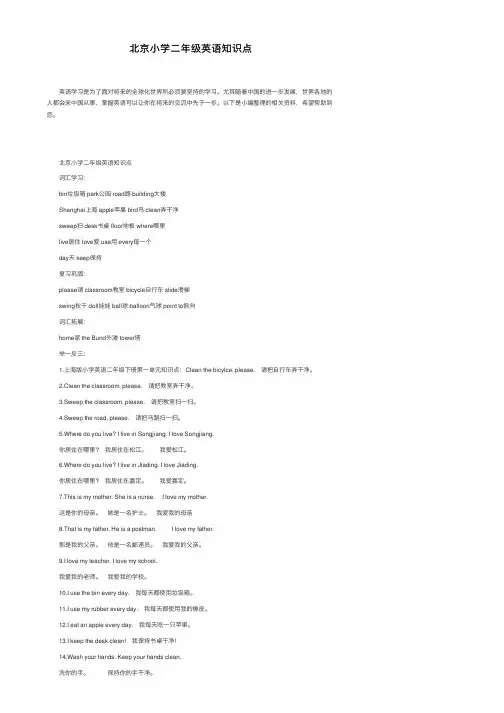
北京⼩学⼆年级英语知识点英语学习是为了⾯对将来的全球化世界所必须要坚持的学习。
尤其随着中国的进⼀步发展,世界各地的⼈都会来中国从事,掌握英语可以让你在将来的交流中先于⼀步。
以下是⼩编整理的相关资料,希望帮助到您。
北京⼩学⼆年级英语知识点词汇学习:bin垃圾箱 park公园 road路 building⼤楼Shanghai上海 apple苹果 bird鸟 clean弄⼲净sweep扫 desk书桌 floor地板 where哪⾥live居住 love爱 use⽤ every每⼀个day天 keep保持复习巩固:please请 classroom教室 bicycle⾃⾏车 slide滑梯swing秋千 doll娃娃 ball球 balloon⽓球 point to指向词汇拓展:home家 the Bund外滩 tower塔举⼀反三:1.上海版⼩学英语⼆年级下册第⼀单元知识点:Clean the bicylce, please. 请把⾃⾏车弄⼲净。
2.Clean the classroom, please. 请把教室弄⼲净。
3.Sweep the classroom, please. 请把教室扫⼀扫。
4.Sweep the road, please. 请把马路扫⼀扫。
5.Where do you live? I live in Songjiang. I love Songjiang.你居住在哪⾥? 我居住在松江。
我爱松江。
6.Where do you live? I live in Jiading. I love Jiading.你居住在哪⾥? 我居住在嘉定。
我爱嘉定。
7.This is my mother. She is a nurse. I love my mother.这是你的母亲。
她是⼀名护⼠。
我爱我的母亲8.That is my father. He is a postman. I love my father.那是我的⽗亲。
北京版二年级全册英语知识点
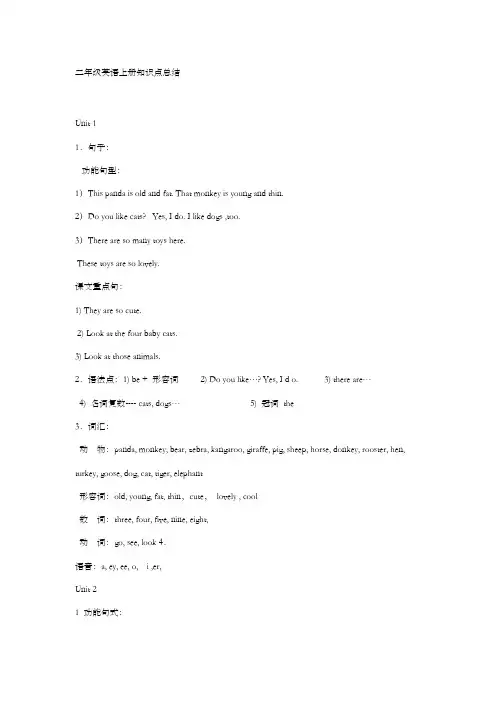
二年级英语上册知识点总结Unit 11.句子:功能句型:1)This panda is old and fat. That monkey is young and thin.2)Do you like cats? Yes, I do. I like dogs ,too.3)There are so many toys here.These toys are so lovely.课文重点句:1) They are so cute.2) Look at the four baby cats.3) Look at those animals.2.语法点:1) be + 形容词2) Do you like…? Yes, I d o. 3) there are…4) 名词复数---- cats, dogs… 5) 冠词the3.词汇:动物:panda, monkey, bear, zebra, kangaroo, giraffe, pig, sheep, horse, donkey, rooster, hen, turkey, goose, dog, cat, tiger, elephant形容词:old, young, fat, thin,cute,lovely , cool数词:three, four, five, nine, eight,动词:go, see, look 4.语音:a, ey, ee, o, i ,er,Unit 21 功能句式:What color is your hair? It’s white. I have short arms and small hands. I have long arms but short legs. I am tall. 2语法点:a.名词的复数形式, legs arms, ears, eyes,不规则变化foot---feet。
b. 介词and和but。
北京版小学英语二年级上下册知识点梳理
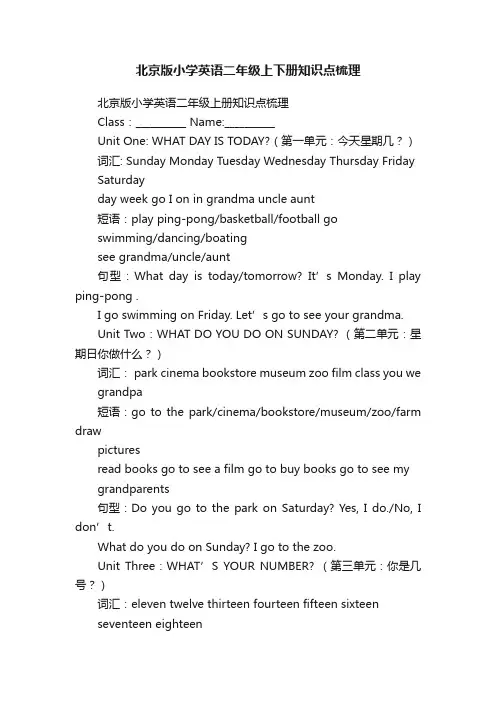
北京版小学英语二年级上下册知识点梳理北京版小学英语二年级上册知识点梳理Class:__________ Name:__________Unit One: WHAT DAY IS TODAY?(第一单元:今天星期几?)词汇: Sunday Monday Tuesday Wednesday Thursday Friday Saturdayday week go I on in grandma uncle aunt短语:play ping-pong/basketball/football goswimming/dancing/boatingsee grandma/uncle/aunt句型:What day is today/tomorrow? It’s Monday. I play ping-pong .I go swimming on Friday. Let’s go to see your grandma.Unit Two:WHAT DO YOU DO ON SUNDAY? (第二单元:星期日你做什么?)词汇: park cinema bookstore museum zoo film class you we grandpa短语:go to the park/cinema/bookstore/museum/zoo/farm drawpicturesread books go to see a film go to buy books go to see my grandparents句型:Do you go to the park on Saturday? Yes, I do./No, I don’t.What do you do on Sunday? I go to the zoo.Unit Three:WHAT’S YOUR NUMBER? (第三单元:你是几号?)词汇:eleven twelve thirteen fourteen fifteen sixteenseventeen eighteennineteen句型:What’s your/Lala’s/Kate’s number? My/His/Her number is twelve.How many pigs are there on your farm? I/we have sixteen pigs.Unit Four:There are many animals. (第四单元:有许多动物。
北京版小学生英语知识点总结
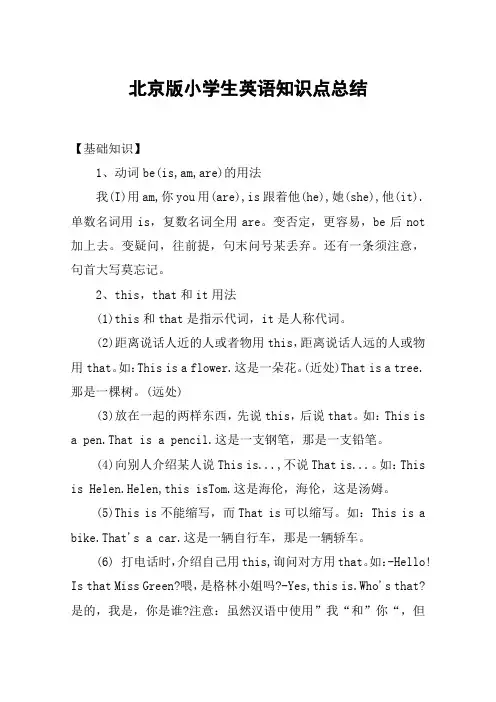
北京版小学生英语知识点总结【基础知识】1、动词be(is,am,are)的用法我(I)用am,你you用(are),is跟着他(he),她(she),他(it).单数名词用is,复数名词全用are。
变否定,更容易,be后not 加上去。
变疑问,往前提,句末问号某丢弃。
还有一条须注意,句首大写莫忘记。
2、this,that和it用法(1)this和that是指示代词,it是人称代词。
(2)距离说话人近的人或者物用this,距离说话人远的人或物用that。
如:This is a flower.这是一朵花。
(近处)That is a tree.那是一棵树。
(远处)(3)放在一起的两样东西,先说this,后说that。
如:This isa pen.That is a pencil.这是一支钢笔,那是一支铅笔。
(4)向别人介绍某人说This is...,不说That is...。
如:This is Helen.Helen,this isTom.这是海伦,海伦,这是汤姆。
(5)This is不能缩写,而That is可以缩写。
如:This is a bike.That's a car.这是一辆自行车,那是一辆轿车。
(6) 打电话时,介绍自己用this,询问对方用that。
如:-Hello! Is that Miss Green?喂,是格林小姐吗?-Yes,this is.Who's that?是的,我是,你是谁?注意:虽然汉语中使用”我“和”你“,但英语中打电话时绝不可以说:I am...,Are you...?Who are you?(7)在回答this或that做主语的疑问句时,要用it代替this 或者that。
如:①-Is this a notebook?这是笔记本吗?-Yes,it is.是的,它是。
②-What's that?那是什么?-It's a kite.是只风筝。
北京版二年级英语下册知识点梳理
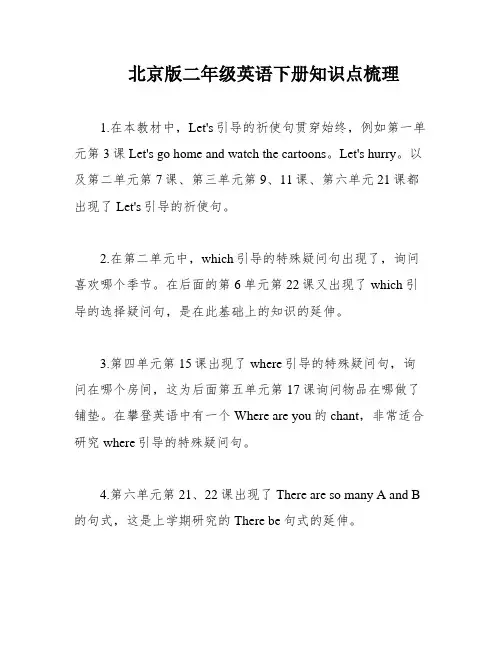
北京版二年级英语下册知识点梳理1.在本教材中,Let's引导的祈使句贯穿始终,例如第一单元第3课Let's go home and watch the cartoons。
Let's hurry。
以及第二单元第7课、第三单元第9、11课、第六单元21课都出现了Let's引导的祈使句。
2.在第二单元中,which引导的特殊疑问句出现了,询问喜欢哪个季节。
在后面的第6单元第22课又出现了which引导的选择疑问句,是在此基础上的知识的延伸。
3.第四单元第15课出现了where引导的特殊疑问句,询问在哪个房间,这为后面第五单元第17课询问物品在哪做了铺垫。
在攀登英语中有一个Where are you的chant,非常适合研究where引导的特殊疑问句。
4.第六单元第21、22课出现了There are so many A and B 的句式,这是上学期研究的There be句式的延伸。
5.第三单元第10课出现了Can I use…的句式,为后面第四单元第14课Can you give me…?打下了基础。
重点:1.本教材中的四会、三会单词分类包括:季节(夏天、冬天、春天、秋天)、自然界(花、草、叶子/树叶、天空、云)、家居(房间、卧室、浴室、厨房、客厅)、家居用品(桌子、椅子、电话、床、沙发、电脑、牙刷、肥皂、牙膏、洗发水、筷子、碗、刀、冰箱)、餐饮(早餐、午餐、晚餐、牛奶、茶、果汁、咖啡、豆浆、鸡蛋、米饭、鱼、饼干、豆腐、肉、面条、面包)、水果(橙子)和蔬菜。
2.重点词汇包括四会、三会单词,需要注意单词的拼写和发音。
3.句型方面,需要掌握Let's引导的祈使句、which引导的特殊疑问句、where引导的特殊疑问句、There are so many A and B的句式以及Can I use…和Can you give me…的句式。
4.在研究过程中,可以通过chant、歌曲、游戏等多种形式进行练,提高研究效果。
北京版小学英语二年级上下册知识点梳理 (1)
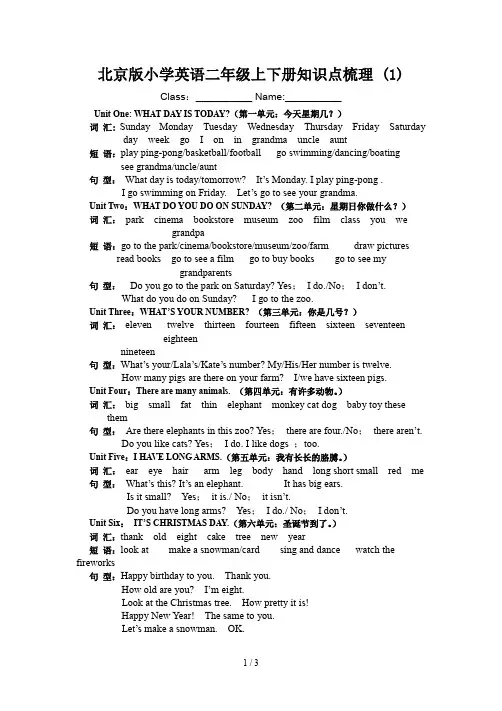
北京版小学英语二年级上下册知识点梳理 (1)Class:__________ Name:__________Unit One: WHAT DAY IS TODAY?(第一单元:今天星期几?)词汇: Sunday Monday Tuesday Wednesday Thursday Friday Saturday day week go I on in grandma uncle aunt短语:play ping-pong/basketball/football go swimming/dancing/boating see grandma/uncle/aunt句型:What day is today/tomorrow? It’s Monday. I play ping-pong .I go swimming on Friday. Let’s go to see your grandma.Unit Two:WHAT DO YOU DO ON SUNDAY? (第二单元:星期日你做什么?)词汇:park cinema bookstore museum zoo film class you wegrandpa短语:go to the park/cinema/bookstore/museum/zoo/farm draw pictures read books go to see a film go to buy books go to see mygrandparents句型:Do you go to the park on Saturday? Yes;I do./No;I don’t.What do you do on Sunday? I go to the zoo.Unit Three:WHAT’S YOUR NUMBER? (第三单元:你是几号?)词汇:eleven twelve thirteen fourteen fifteen sixteen seventeeneighteennineteen句型:What’s your/Lala’s/Kate’s number? My/His/Her number is twelve.How many pigs are there on your farm? I/we have sixteen pigs.Unit Four:There are many animals. (第四单元:有许多动物。
北京课改版小学二年级下册-英语重点知识汇总梳理
2. No, thank you.
不用了,谢谢。
Unit3 Lesson11第一部分:单词
1
bathroom
卫生间
2
call
打电话
3
phone
电话
4
towel
毛巾
5
shampoo
洗发水
6
soap
香皂
7
toothpaste
牙膏
8
want
想要
第二部分:短语
1
over there
在那边
中文
序号
英文
中文
1
dad
爸爸
2
for
为……所需
3
bread
面包
4
milk
牛奶
5
egg
鸡蛋
6
an
一,一个
7
fruits
水果
8
soy milk
豆浆
9
noodles
面条
10
baozi
包子
第二部分:短语
序号
英文
中文
序号
英文
中文
1
havebreakfast
吃早餐
2
have bread
吃面包
3
have milk
在床底下
4
behind the sofa
在沙发后
第三部分:句型
1. Where is my shirt?
我的衬衫在哪?
2. It’s under the bed.
在床底下。
Unit4 Lesson14第一部分:单词
1
this
北京版小学二年级英语总结
Unit 1 what day is todaySunday Monday Tuesday Wednesday Thursday Friday Saturday uncle aunt wait叔叔阿姨等候ping-pong basketball football chess play what乒乓篮球足球象棋玩什么What day is today It’ s Tuesday. I play ping-pong today.What day is tomorrow It’s Thursday. I go swimming on Thursday.Unit 2 what do you do on Sundaygo to the cinema bookstore museum animals special eagle leafpark特别的鹰树叶go to the go to the draw read books go to see a go to buy books go to see my play football farm zoo pictures film grandparentsDo you go to the park on Saturday, Kate What do you do on SundayYes, I do. / No, I don’t.I go to the zoo.Unit3 what’ s your numberpig duck sheep horse time plus whatever猪鸭子绵羊马时间、倍加不论什么tiger sky try老虎天空试一试What’ s your number My number is twelve.How many pigs do you have on your farm I have sixteen pigs.How many girls do you have in your class We have nineteen girls.Start it well, and carry it through.启动它,并进行经过。
北京版二下英语知识梳理
二年级(下)英语单元知识重点Unit one What time is it?一、单词。
1. one 12.two 23. three 34.four 45. five 56.six 67. seven 7 8.eight 89. nine 9 10.ten 1011. eleven 11 12.twelve 1213. twenty 20 14.thirty 3015. forty 40 16.fifty 50二、短语。
1. get up 起床2.time时间3. o’clock 点钟4.go to school去上学5. have dancing lessons 上舞蹈课6.go home回家7.watch the cartoons看卡通片 8.go to bed去睡觉9. go to the drawing lessons去上美术课三、重点句型。
1. What time is it?现在几点了?It is seven o’clock.现在七点整。
2. When do you go home?你什么时候回家?At five thirty.五点半回家。
3.It’s time to go to bed.该去睡觉了。
Unit two W hat’s for breakfast?一.单词。
k 牛奶2.bread面包3.eggs 鸡蛋4. fruits水果5. soy milk 豆奶6. noodles面条7. baozi 包子 8.dad 爸爸9. hungry 饿的 10.thirsty 渴的11. ice cream 冰淇淋 12.vegetable 蔬菜二、短语。
1.fish and rice鱼和米饭2. fried rice 炒米饭3. rice noodles米线4.orange橘子5.a mantou and a fried egg馒头和煎鸡蛋6. hamburger 汉堡包7.a hot dog热狗8.a glass of water 一玻璃杯水 9.a glass of soy milk 一杯豆奶10. a cup of tea 一杯茶 11.a glass of juice一杯果汁三、重点句型。
北京版小学英语二年级上册单词和句型
二年级上知识点Unit 1一、必会单词:week: Sunday Monday Tuesday Wednesday Thursday Friday Saturday 星期星期日星期一星期二星期三星期四星期五星期六today tomorrow day night weekend今天明天白天晚上周末拓展:relatives: grandma grandpa grandparents uncle aunt cousin亲戚:奶奶/姥姥爷爷/姥爷祖父母叔叔阿姨表兄弟姐妹brother sister daughter son nephew niece weekday兄弟姐妹女儿儿子侄子/外甥侄女/外甥女工作日昨天yesterday人称代词主格:I我you你he他she她it它we我们you你们they他/她/它们人称代词宾格:me我you你him他her她it它us我们you你们them他/她/它们形容词性物主代词:my我的your你的his他的her她的its它的our我们的your你们的their他/她/它们的疑问词:when什么时候where哪里who谁why为什么how怎么样what什么how many多少(可数)how much多少(不可数)how old 多大(年纪)how long多长(时间或长度)二、必会短语:play ping-pong play basketball play football go swimming go dancing打乒乓球打篮球踢足球去游泳,去跳舞,go boating go to see my/your/our/ grandma and grandpa/grandparents去划船去看我的/你的/我们的/奶奶和爷爷爷爷奶奶play chess下棋三、必会句型:What day is today?It’s Monday. 今天是周几?今天是周一。
I play football today. 我今天踢足球I play chess on Tuesday.我周二下棋。
- 1、下载文档前请自行甄别文档内容的完整性,平台不提供额外的编辑、内容补充、找答案等附加服务。
- 2、"仅部分预览"的文档,不可在线预览部分如存在完整性等问题,可反馈申请退款(可完整预览的文档不适用该条件!)。
- 3、如文档侵犯您的权益,请联系客服反馈,我们会尽快为您处理(人工客服工作时间:9:00-18:30)。
北京版小学二年级英语下册(一年级起点)知识点梳理教材共6个单元:Unit one What time is it?(第一单元几点了?)单元目标:1、能够就具体时间及一些事情的安排做出询问、应答,并结合语境用”Let’s 、、、、”(我们一起……)初步提出建议。
2、能听懂、认读time(时间), o’clock(整点), when(什么时候)及1、5、20、30、50等与时间相关的单词,并能在相应情景中结合具体动词短语进行运用。
3、能根据字母 a 在单词中发音为/?/ (类似发音“爱”)的规律拼读单词。
4、能理解对话内容,并能朗读对话。
Unit two What’s for breakfast? (第二单元早餐吃什么?)单元目标:1、能够用”What’s for breakfast?”(早餐吃什么?) “I’m hungry、”(我饿了。
) 等日常交际用语询问她人就餐时间吃什么,点餐以及表达自己的情况。
2、能听懂、指认并读出本单元有关食物与饮料的单词及短语。
3、能初步感知名词的可数与不可数,尝试用a(一个), an(一个), some(一些), a cup of(一杯), a glass of(一杯) 表达食物数量。
4、能根据字母i 在单词中发音为/i/(类似发音“一”) 的规律拼读单词。
Unit three Welcome to my house (第三单元欢迎来我家)单元目标:1、能在一定的情景中运用“Would you like to 、、、?”(您愿意……不?)礼貌地询问对方的意愿或发出邀请;能用”Can I use 、、、, please?”(请问,我可以用……不?)提出自己的请求并做出相应回答。
2、能听懂、认读有关餐具类的单词spoon(勺子), bowl(碗), chopsticks(筷子), glass(玻璃杯), dish(盘), fork(叉子), knife(刀子), 洗漱用品的单词towel(毛巾), soap(肥皂), shampoo(洗发剂), toothbrush(牙刷), mirror(镜子), 能听懂、认读有关人物日常活动的动词短语,如:come to my room(来到我的房间), read my books(读我的书), ride my bike(骑我的车), play with my toys(玩我的玩具), sit on the chair(坐在椅子上)等,并能在相应情景中运用。
3、感知元音字母e及字母组合ea在单词中的读音/e/,能认读符合语音规则的单词,如:bed(床), pen(钢笔) , red(红色)等。
Unit four Where is my shirt? (第四单元我的衬衫在哪?)单元目标:1、能用”Where is 、、、? Where are 、、、?”(……在哪?)询问某人某物在哪里,并用on(在上面), in(在里面) , under(在下面), behind(在后面) 做简单应答。
2、能用”Is this 、、、?” (这个就是……?)“Are these 、、、?” (这双……?这条……?)询问某人某物就是否就是对方的,并能用”Yes, it is、”“No, it isn’t、”与”Yes, they are、”“No, they aren’t、”做应答。
3、能听懂、认读衣物类单词shirt(衬衫), coat(外套,大衣), dress(连衣裙), cap(帽子), jacket(夹克) 以及trousers(长裤), shoes(鞋), shorts(短裤),socks(袜子), pants(休闲裤)复数衣物类单词。
4、感知字母o在单词中的读音/?/、(类似发音“奥”)Unit five How do you go to school? (第五单元您怎么去上学?)单元目标:1、能够听懂、会说询问交通方式的相关功能句及其答语。
能够在真实情景中合理运用功能句式及固定短语就自己及她人的出行方式进行准确描述、询问与回答。
2、能够听懂、认读表达出行方式的固定短语及表示地点、场所的词汇与固定搭配,并能够正确书写交通工具词汇。
3、能够根据字母u在单词中的发音/?/(类似发音“阿”)正确拼读单词。
Unit six Which season do you like?单元目标:1、能谈论季节,用” I like 、、、、” (我喜欢……)表达自己喜爱的季节,并简单说明理由或表达常做的事情。
2、能听懂、指认并读出表达四季的词与表达活动的动词短语,如:plant trees(植树), go camping(去露营), pick apples(摘苹果), play in the snow(在雪里玩)、3、感受字母组合ar在单词中的读音/a:/(类似发音“啊”)Unit Function Language andstructureKeyvocabularyLetters and soundsUnit one Talking about time -What time is it?-It’s seven o’clock、-When do you go home?-At five thirty、-What time is it?-It’s nine twenty、It’stime to go to bed、thirty to fiftyo’clockgo home, get up,go to school, go tobed, go to thedrawing lessons,watch the cartoonsa: bad, bag, cat, jam, van,apple, flag, glad, panda,happy, handUnit two Having meals -What’s for breakfast?-We have bread, milk,eggs, and fruits、-Can I have fish andrice, please?-Yes、Here you are、-I’m hungry/thirsty、-Have an orange/ a glassof water、bread, milk, eggs,fruits, soy milk,noodles, fish, friedrice, a hamburger,a hot dog, an egg,an orange, a glassof water/juice/soymilk, a cup of teai: fish, dish, big, gift, river,king, six, film, it, singUnit three Invitation andasking forpermission -Would you like tocome to my room?-Yes, we’d love to、-Would you like to usethe glasses?-No, thank you、-Can I use thebathroom, please?-Sure、/ Sorry youcan’t、come to my room,read my books,ride my bike, playwith my toysthe spoon,theglasses, the bowl,the chopsticks, thebathroom, thetowel, the soap,the shampoo, thetoothpastee: bed, pen, red, pet, get,neck, leg, desk, vest, jello,yellow, egg, elephant,ea:head, breadUnit four 、Talking aboutwhere the thingsare, -Where is my shirt?-It’s under the bed、-Is this your jacket?coat, cap, dress,shirt, jacket,football, watcho: box, dog, ox, fox, long,clock, mop, top, hot、Asking and telling ownership -Yes, it is、/ No, itisn’t、-Are these yourtrousers?-Yes, they are、/ No,they are not、shorts, shoes,trousers, socksbehind the sofa,under the bed, inthe box,on the deskUnit five Asking and tellingthe way to travel -How do you go toschool?-I go to school by bus、-How does your dad goto work?-He goes to work bycar、-Does he come by taxi?-Yes, he does、/No, hedoesn’t、school, thecinema, the zooby bus / bike / car/ taxi / subway, onfootcome / go to thepark / go to thehospitalu: hut, cup, lunch, nut,duck, lucky, busUnit six Talking aboutseasons -How many seasons arethere in a year?-There are four、-Do you like winter?-Yes, I do、/ No, I don’tlike winter、-Which season do youlike?-I like spring、I can flya kite、season, year, hourspring, summer,autumn, wintergo camping, playin the snow, fly akite, pick applesar: car, park, star, arm,card, party。
